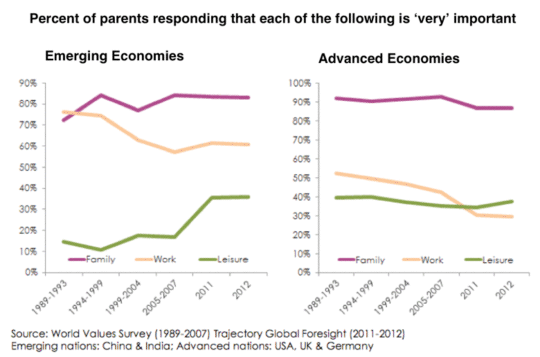
Vol. XIII, No. 7, September 2013
- Editor's corner
- Wine about to overtake beer in popularity
- Foundations Entertainment University just 1.5 weeks away
- The disruption of convenient, cheap and easy
- Attendance and spending at community entertainment venues
- The importance of leisure in emerging and advanced economies
- Exceeding customer expectations; The unachievable myth
- Bocce, the horseshoes for hipsters
The importance of leisure in emerging and advanced economies
How the priority of family interacts with our working lives and need for leisure varies widely throughout the world. Family, work and leisure occupy a great deal for our daily time. Today there is an increasing overlap of all three spheres, especially in advanced economies where flexible working hours and greater gender equality have blurred the separation of work and personal life.
In advanced economies, the importance of family for parents has been basically steady since 1989-1993 (92% to 87% in 2012 saying it is very important to them), contrary to the popular press reporting that the family is in decline. Work has declined the most in importance, from 52% in 1989-1993 to 29% in 2012. Surprisingly, even with less importance placed on work, leisure has not increased in importance (40% to 38%).

In emerging economies, the importance (rated very important) of family is up slightly, 72% to 82%. The most significant changes are a sharp decline in the importance of work (76% to 61%) and a significant rise in the importance of leisure, from 15% in 1989-1993 to 36% in 2012. In 1989-1993, parents considered work more important than family. In 2012, family was the most important.
In advanced economies, parents’ level of satisfaction with their leisure varies with the age of the youngest child. As children grow older they spend less time in the care of their parents, so parents’ satisfaction with their leisure increases as they have more time for leisure activities on they own. This trend is not evident in emerging cultures where there is still little fluctuation in parents’ satisfaction with leisure as the family ages.
Source: The Modern Family and the Changing World, Trajectory Global Foresight, January 2013.
Vol. XIII, No. 7, September 2013
- Editor's corner
- Wine about to overtake beer in popularity
- Foundations Entertainment University just 1.5 weeks away
- The disruption of convenient, cheap and easy
- Attendance and spending at community entertainment venues
- The importance of leisure in emerging and advanced economies
- Exceeding customer expectations; The unachievable myth
- Bocce, the horseshoes for hipsters


